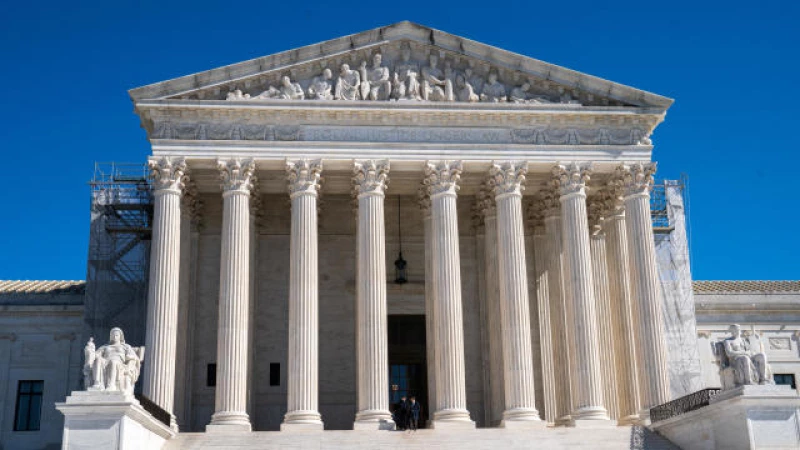Washington — The Supreme Court on Monday agreed to allow Idaho officials enforce a ban on gender-affirming medical care for nearly all transgender minors statewide, granting a request from state officials to narrow the scope of a lower court's order that blocked the law from taking effect.
The court's conservative majority granted the state's request for a stay over the objections of the three liberals, Justices Sonia Sotomayor, Elena Kagan and Ketanji Brown Jackson. The stay does not apply to the two transgender teenage plaintiffs in the case and the care they are seeking, but blocks the more expansive portions of the lower court's decision.
"The district court's order promised to run for the life of this lawsuit, thus preventing Idaho from executing any aspect of its law for years. Meanwhile, the plaintiffs face no harm from the partial stay the State requests," Justice Neil Gorsuch wrote in an opinion that was joined by Justices Clarence Thomas and Samuel Alito.
The Idaho Controversy
Idaho's Vulnerable Child Protection Act, also known as H.B. 71, has sparked a legal battle after being enacted into law by GOP Gov. Brad Little. This legislation prohibits health care providers in the state from administering certain medications or surgeries with the intent to alter a child's perceived gender if it does not align with their biological sex. The restricted treatments include puberty-blocking drugs, hormone therapy, and surgeries, with violators facing potential imprisonment of up to 10 years along with fines.
Challenging the constitutionality of the law, parents of two transgender girls filed a lawsuit against the state. Referred to as Pam Poe and Jane Doe in court documents, the girls have been diagnosed with gender dysphoria and have undergone puberty blockers and estrogen therapy. In addition to questioning the law's constitutionality, the families requested a federal district court to halt the law's enforcement during the legal proceedings.
In December 2023, the district court granted their request, determining that the law likely breaches the constitution. The court also highlighted that denying gender-affirming care could lead to "severe psychological distress" for Pam Poe and Jane Doe. U.S. District Judge B. Lynn Winmill emphasized in his ruling that "transgender children deserve equal treatment under the law" and that parents should have the authority to make crucial decisions regarding their children's well-being.
The statewide injunction was granted by the court, citing the difficulty in providing relief to plaintiffs Pam Poe and Jane Doe without compromising their anonymity due to the use of pseudonyms. The judge expressed concerns that limiting the injunction to only the named plaintiffs could lead to additional lawsuits, resulting in unnecessary and repetitive litigation.
State officials requested the U.S. Court of Appeals for the 9th Circuit to either halt the district court's order or narrow its scope to apply solely to Pam Poe and Jane Doe. However, the appeal was denied. Subsequently, Idaho sought urgent relief from the Supreme Court while the 9th Circuit reviews the case, asking the justices to limit the injunction to only Pam Poe and Jane Doe, a request that was granted by the high court in its recent order.
In their petition to the Supreme Court, Idaho officials, represented by the conservative legal organization Alliance Defending Freedom, criticized the broad reach of the district court's injunction, labeling it as "excessive." They argued that the injunction went too far by prohibiting the enforcement of the law "across the board and in all situations." The officials suggested that relief tailored to the specific teenagers involved in the case could easily be implemented by restraining enforcement against individuals providing the requested treatments to Pam Poe and Jane Doe.
"Plaintiffs only seek estrogen hormone therapies, yet the district court issued a universal injunction against the law in its entirety, stopping enforcement even in situations where Plaintiffs' experts agree medical intervention is not appropriate," Idaho officials wrote. "Those applications involve the most extreme surgical treatments and the most vulnerable minors, who will lose the protections of Idaho's law and will instead be governed by an injunction obtained by others who do not and cannot speak for them."
They went on to claim that the "overbroad" injunction would allow doctors to experiment on minors with "dangerous" surgeries, such as mastectomies for patients with gender dysphoria.
But the American Civil Liberties Union, which is representing the family, warned the Supreme Court that allowing the state to enforce the law would cause severe harm to Pam Poe and Jane Doe.
Granting the request from Idaho officials would jeopardize "their ability to continue receiving the medical care that they, their parents, and their doctors all agree is medically necessary for their health and well-being" and require them to "give up their anonymity as transgender plaintiffs in this case to try to access that care," ACLU lawyers wrote in a filing.
They also noted that because the law imposes criminal penalties on doctors and pharmacists who provide gender-affirming care to minors, harm to Pam Poe and Jane Doe cannot be remedied without an injunction shielding health care providers from prosecution so they can continue treating them.
Additionally, because Pam Poe and Jane Doe are receiving ongoing medicare care, Idaho's ban would disrupt that treatment, and a narrowed injunction would jeopardize their access to care.
"The court order upholds the current situation — where the decision regarding whether to seek gender-affirming medical treatment for adolescents with gender dysphoria is determined by their parents, in collaboration with the children's healthcare provider," stated the legal representatives from the ACLU. "Parents, with input from medical professionals, carefully consider the risks and benefits of treatment, similar to other medical choices."
Over 20 states have enforced restrictions on gender-affirming medical care for minors, although some laws have been halted by courts in certain states, as reported by the Human Rights Campaign.







